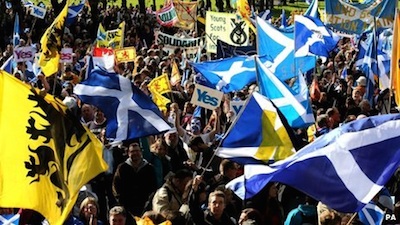
A surge of support for Scottish independence following that country’s referendum last week has seen nearly 40,000 people swell the ranks of the Scottish National Party (SNP). The party’s membership is now the third largest in Britain, behind only the Conservative and Labour parties.
The ‘Yes Scotland’ campaign narrowly lost the vote for Scottish independence with 45 percent against the ‘No’ campaign’s 55 percent, from a record-breaking voter turnout of 84 percent.
Since the vote, SNP leader Alex Salmond declared his intention to resign as Scotland’s First Minister. Yet SNP membership has now rocketed to over 65,000, compared to 25,642 last week. The party is also at a record 49% in the polls.
Scotland’s Green Party, the only other major party to back independence, has also seen an additional 3,000 people join since the referendum.
“With this influx of new members joining the SNP since the referendum - many of them from Labour’s heartlands - the Westminster establishment now face serious pressure to deliver on the substantial new powers for Scotland which the No camp promised during the campaign,” an SNP spokesperson said.
Just over a week before the referendum, the Conservatives, Labour and Liberal Democrats promised Scots more autonomy over tax and welfare spending if they chose to stay in the union with England and Wales.
However, those promises were quickly reneged upon following the result. Within a day fo securing a victory in the referendum, British PM David Cameron said that constitutional reforms could not be delivered until after the 2015 general election, and that changes would have to be linked with those in other areas.
SNP Business Convener Derek Mackay, a member of the Scottish parliament, said Westminster must to deliver on its pledges, or ‘No’ parties would “face the consequences at the ballot box.”
“Scotland’s referendum was an incredible triumph of democracy - and the new wave of democratic engagement and activism the Yes campaign inspired shows no signs of stopping.
“It is this new wave of democratic engagement which will hold the Westminster establishment to account on their vow of more powers for Scotland - people simply won’t accept the same old politics as usual from Westminster.”
Thousands of pro-independence activists, determined to continue their fight for Scottish statehood, launched a new campaign called ‘the 45 percent’ with the aim of sustaining the grassroots movement’s momentum.
Tommy Sheridan, a former MSP and leader of Scotland’s socialist coalition, Solidarity, has urged ‘Yes’ supporters to back candidates who support independence and back another referendum in 2020. He says the SNP are the most likely of the major parties to deliver on this.
“Let’s punish the reactionary and dishonest ‘No’ parties at the ballot box next May,” said Sheridan. “Let’s punish the shameful Labour party in particular for siding with the bankers, bosses, billionaires and millionaires to try and crush our dream of a new and better Scotland with an avalanche of fear and lies.
“We have youth, energy and hope on our side. Hope can triumph over Fear in 2020,” he added.
In view of the political revolution apparently underway, former Labour first minister Henry McLeish warned his party were in danger of dying out in Scotland.
McLeish said: “We can’t ignore this. It’s happening in solid areas of the old Red Clydeside and in Dundee,” he said. “We need full autonomy from UK Labour so we can have a clear identity. Ed Miliband’s Labour is fighting for English votes on different issues.”
Deputy prime minister Nick Clegg accused the Tories of being more concerned with the threat from the right-wing UKIP than the vow made to Scotland.
He said: “The Conservatives, in their rush to protect themselves from an attack from the right, are only concerned about English votes on English matters.
“Worse still, if the Conservatives enter into a Dutch auction with UKIP over ever more extreme solutions to the issue of English votes they could jeopardise the union they purport to defend.”
Cameron shrugged off such concerns, instead crudely boasting of his win. He was heard telling former New York mayor Michael Bloomberg of his pleasure in informing the queen of England that Scotland had not left the union. A microphone was left on and caught the comments.
He said: “The definition of relief, if you are Prime Minister of the United Kingdom, is ringing up Her Majesty the Queen and saying ‘Your Majesty, it is all right, it’s okay. That was something. She purred down the line.”
![[Irish Republican News]](https://republican-news.org/graphics/title_gifs/rn.gif)
![[Irish Republican News]](https://republican-news.org/graphics/title_gifs/harp.gif)

